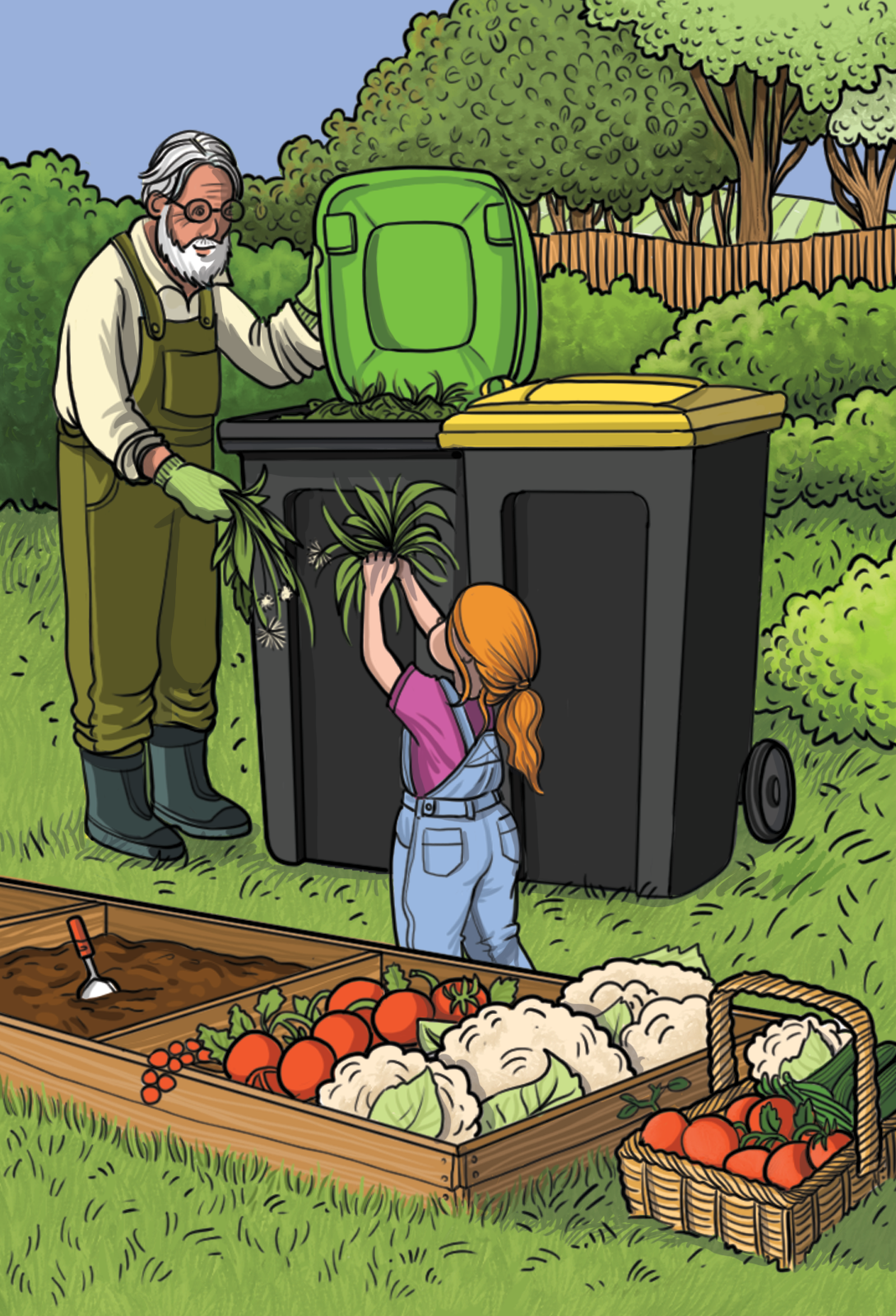In Your Garden

| Garden Investment | Useful as climate adaptation | As emission mitigation |
|---|---|---|
Plant and care for trees and shrubs. Consider deciduous ones (which lose their leaves in winter, that lets light through) to shade north and west windows at home, and evergreen at the south. | Trees provide shade in summer, and wind shelter. Urban areas are losing trees as they intensify land use. Tree shade moderates urban ‘heat islands.’ Outdoor shade will be increasingly important as summer temperatures rise.Including fruiting trees and shrubs increases your resilience to weather-affected food shortages from elsewhere. | Trees and shrubs use and store CO2 as lignin. Larger woody prunings, stored dry, become woodstove fuel for your or neighbours’ use. Use wood to substitute for oil, gas or coal, as the wood is renewable (the carbon dioxide released is from atmosphere carbon previously captured by the living tree, not a fossil supply).Advice on selecting purchased firewood: https://www.warmercheaper.co.nz/what-is-good-wood Purchased firewood will cost you about 11c per kWhr of heating compared to direct electric heating 25c per kWhr or efficient heat pump 9c per kWhr. |
Make a ‘low-flammable’ garden fire-break Make this close to your house, especially if the external wall cladding or adjacent deck is wood. Seek advice from FENZ on suitable plant choices. https://www.fireandemergency.nz/fire-safety-campaign-resources/low-flammability-plants/ | Reduce risk of summer wildfire spreading to your rural or suburban home. Be aware of accumulating fire ‘fuel’ in the summer near your house, especially in the prevailing summer dry wind direction (e.g. facing Nor’Westers in Canterbury). | In gardening: Minimise use of petrol-powered mowers, saws, and branch shredders, which are high emission. Avoid fuel-powered leaf-blowers (collect for compost or use hand rake or broom). Battery powered alternatives are available when equipment needs replacement. Consider sharing equipment with friends or hiring it instead of buying to reduce embodied carbon. |
Cut grass less-frequently
| Slightly taller grass (above 25mm) is more resilient in droughts and becomes less dependent on watering, but beware of creating summer wild-fire fuel of tall grass stalks, especially near your house (see above) | In gardening: Minimise use of petrol-powered mowers, saws, and branch shredders, which are high emission. Avoid fuel-powered leaf-blowers (collect for compost or use hand rake or broom). Battery powered alternatives are available when equipment needs replacement. Consider sharing equipment with friends or hiring it instead of buying to reduce embodied carbon. |
| Watering Your Garden - Outdoor investment | Useful as climate adaption | As emission mitigation |
|---|---|---|
Store rainwater from your roof in a tank for use later in garden but not for drinking water, if untreated. Learn more on tank installation: Stored water can be used for toilet flushing, but seek a plumber’s advice and be prepared to seek Building Consent for the plumbing work bringing that water inside, which may be expensive. | A tank moderates the storm peak water flows off your site and may need a slow (preferably automatic) after-rain-dispersal through garden drippers to part-empty the tank before the next heavy rain arrives. In summer it reduces your reliance on drought-restricted Council water supplies when they are under most strain.Stored rainwater can also be useful in summer fire-fighting. | Note that plastics manufacture from petrochemicals has some carbon impact ‘embodied’. On-site rainwater substituted for electrically pumped and treated water supply from the District Council is only a small energy-saver. For example, much of the Timaru water supply is gravity-fed from source. Pumping of water supply from TDC pipe network is responsible for annual 11kg CO2e per average household supplied, which is a much smaller impact than plastic tank-making! |
| Water Action Choices | Useful as climate adaptation | As emission mitigation |
| In the garden don’t use sprinklers. Prefer dripper hoses or micro-jets, limited by a timer or use a hand-held garden hose. Limit garden watering to direct onto soil in the cool of early morning or evening, and know it’s not required on every day. Grow drought-tolerant plants in the sunniest and dry soil areas. Mulch around shrubs to reduce summer water evaporation. | Reduces day-time evaporation and humidity, avoids surface run off from over-watering. In a low rainfall summer, it also helps conserve Council supply or your own tank reserve. Reduced urban water demand means more water for nature in the rivers. | Water conservation is a small energy saver, as your water conservation reduces the volume of water to be pumped and treated. |
Last updated: 05 Jun 2024